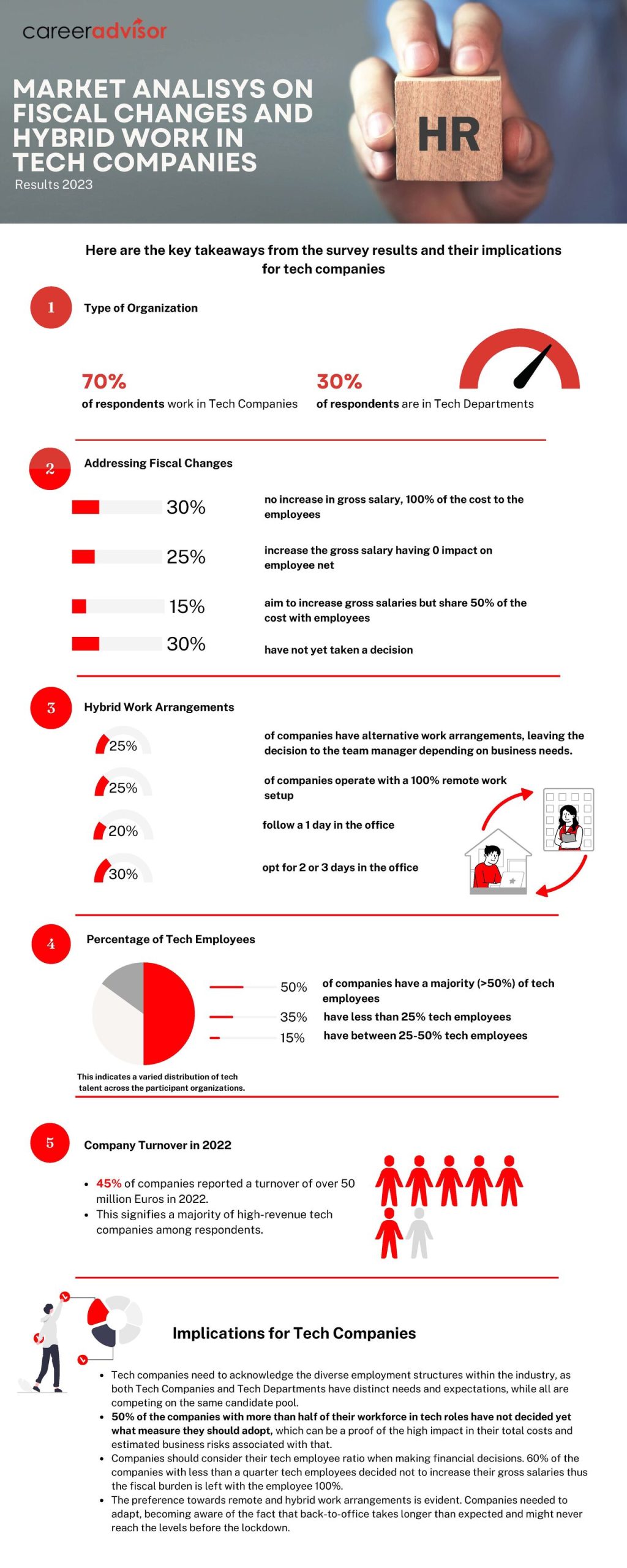:quality(80)/business-review.eu/wp-content/uploads/2023/10/scott-graham-5fNmWej4tAA-unsplash.jpg)
In the evolving landscape of the technology industry, the intersection of fiscal changes and the embrace of hybrid work arrangements has emerged as a critical point of concern for tech companies. A recent qualitative analysis held by Career Advisor has shed light on key takeaways that carry significant implications for the industry, highlighting the pressing need for adaptation and strategic decision-making.
The analysis was conducted within major tech companies to understand the fiscal changes that are about to happen on November 1, 2023, in response to a proposed government bill.
According to the proposed bill, tax exemption in the IT sector will only be retained for earnings below 10,000 lei. For any amount exceeding this RON 10,000 threshold in gross salary, income tax and social contributions will be imposed. However, the new legislation does allow IT employees, as well as those in construction and agriculture, to opt out of contributing to the second pillar of the pension fund (which currently stands at 3.75% but will increase to 4.75% next year). By doing so, they will receive a net salary of RON 9,350 per month (or RON 9,486 starting in 2024), which is higher than the present income. It’s worth noting that IT professionals are exempt from the contribution rate for private pension funds (CAS), corresponding to the private pension fund (4.75% as of 2024) within the limit of a gross salary of RON 10,000.
The analysis insights
The analysis, which garnered responses from professionals in tech companies and tech departments, provided a glimpse into the current state of affairs. An impressive 70% of the respondents hailed from tech companies, underlining the relevance of this analysis to the broader tech sector. Meanwhile, the remaining 30% represented tech departments, whose distinctive needs were equally notable.
One of the most striking findings from the survey was related to changes in employee compensation. Among respondents, 30% reported that their companies had opted not to increase gross salaries, effectively passing the entire cost burden onto employees. A quarter of the companies decided to increase gross salaries to ensure with no negative impact on the net income of their employees. In contrast, 15% of the surveyed tech firms aimed to raise gross salaries but intended to share 50% of the cost with their workforce, showing a more equitable approach. However, 30% of the companies had yet to reach a decision, highlighting the complexity of fiscal considerations in the tech sector.
Another area of focus was the work arrangements. It was observed that 25% of the companies allowed team managers to decide the work arrangement based on business needs. Another 25% of tech firms had transitioned to a fully remote work setup, mirroring the broader shift towards flexible working. Meanwhile, 20% had adopted a one-day-in-the-office policy, emphasizing a cautious approach to office reintegration. Lastly, 30% chose to go with a hybrid model, providing employees the option to work in the office for two or three days a week.
The financial landscape
Delving further into the financial aspect, it was evident that a substantial 45% of the surveyed tech companies reported a turnover of over EUR 50 million in 2022. This data signifies the presence of a majority of high-revenue tech companies among the respondents. These companies bear a unique responsibility to not only compete in the tech talent market but also consider the broader fiscal implications of their decisions.
Implications and recommendations
“These findings show the need for tech companies to embrace the diversity of employment structures within the industry. Tech companies and tech departments often have distinct needs and expectations. However, they all look up for the same pool of talent, necessitating a balanced approach“, explains Madalina Uceanu, managing partner Career Advisor.
The analysis’s revelation that 50% of companies with over half of their workforce in tech roles have not yet decided on compensation changes underscores the gravity of the financial challenges they face.
“Their reluctance may be a challenge to the potential impact on their overall costs and the associated business risks. As such, companies should weigh their tech employee ratio when making crucial fiscal decisions”, adds Madalina.
Moreover, the research highlights the growing preference for remote and hybrid work arrangements. Companies must adapt to this evolving work culture, recognizing that the return to traditional office settings may take longer than initially anticipated and might never fully return to pre-lockdown levels.
“Tech companies must navigate the intricate web of fiscal changes and evolving work arrangements with caution and strategic foresight. Adaptation is the key, and embracing both the specific needs of tech employees and the broader industry trends will be critical for long-term success in the ever-competitive tech sector”, concludes Madalina Uceanu.




:quality(80)/business-review.eu/wp-content/uploads/2024/07/VGP-Park-Timisoara_-8thbuilding_iulie-24.jpg)



:quality(80)/business-review.eu/wp-content/uploads/2024/06/22C0420_006.jpg)

:quality(80)/business-review.eu/wp-content/uploads/2024/06/COVER-1-4.jpg)



:quality(80)/business-review.eu/wp-content/uploads/2024/06/br-june-2.jpg)
:quality(50)/business-review.eu/wp-content/uploads/2024/07/America-House-Offices-Bucharest-Fortim-Trusted-Advisors.jpg)
:quality(50)/business-review.eu/wp-content/uploads/2024/07/BeFunky-collage-33-scaled.jpg)
:quality(50)/business-review.eu/wp-content/uploads/2024/07/BeFunky-collage-32-scaled.jpg)